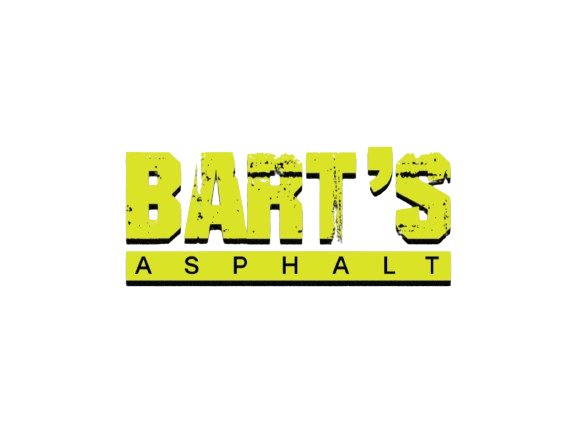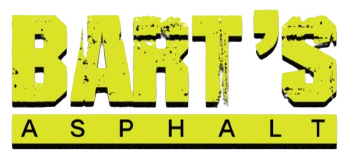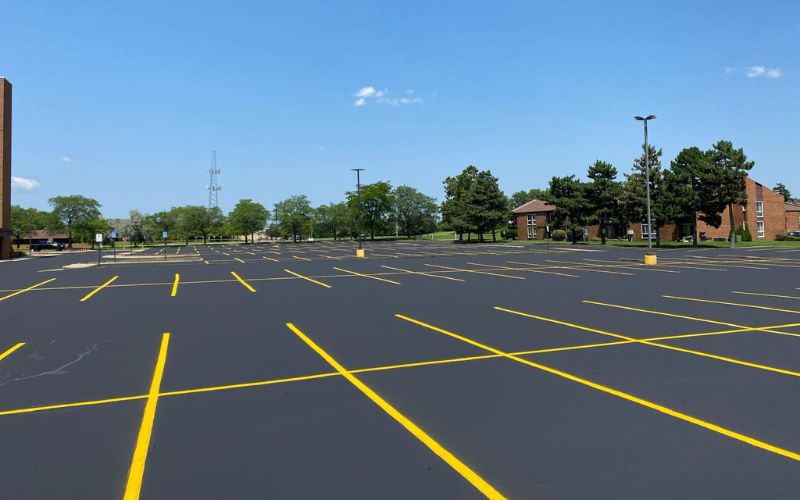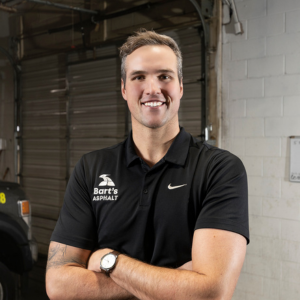For Michigan commercial property owners, well-maintained parking lot striping represents far more than simple aesthetics. Clear, visible line markings ensure safety, maximize capacity, provide proper traffic flow, and maintain compliance with accessibility regulations. In Michigan’s challenging climate, where winter snow and salt can rapidly fade markings, professional line striping becomes an essential component of your property maintenance strategy.
Properly designed and executed parking lot markings contribute directly to customer experience and risk management. When visitors can easily navigate your parking area, find appropriate spaces, and safely enter your business, their overall impression improves. Furthermore, distinct markings significantly reduce liability concerns by clearly delineating pedestrian areas, fire lanes, and other safety zones.
Bart’s Asphalt provides comprehensive commercial line striping services throughout Michigan, combining precision application techniques with durable materials designed to withstand our unique weather conditions. This guide explores the importance of professional line striping, the process involved, and how Michigan businesses can maximize their parking areas while maintaining proper compliance.
Why Line Striping Matters for Michigan Commercial Properties
Line striping serves multiple critical functions for commercial properties across Michigan. Safety considerations top the list, with clear markings helping to control traffic flow, separate pedestrian walkways, and identify hazardous areas. This safety aspect becomes even more crucial during Michigan’s snow season when partially visible markings must still guide drivers and pedestrians.
Space utilization represents another key benefit, as professional striping maximizes your available parking capacity while maintaining appropriate spacing. Many commercial properties discover they can gain 5-10% more parking capacity through professional layout and striping without compromising safety or convenience. For retail, restaurant, and service businesses, this increased capacity can directly impact revenue potential.
Compliance requirements necessitate proper attention to line striping, particularly regarding ADA (Americans with Disabilities Act) specifications. Michigan commercial properties must maintain appropriate number, size, and accessibility features for handicap parking spaces based on lot size. Non-compliance can result in significant penalties, while proper implementation demonstrates your business’s commitment to accessibility.
Additionally, professional appearance significantly impacts customer perception. Crisp, well-maintained parking lot striping projects professionalism and attention to detail – qualities customers naturally associate with your business operations. As one of the first elements visitors encounter, your parking area sets important first impressions before customers even enter your building.
Common Line Striping Applications for Commercial Properties
Michigan commercial properties utilize various line markings to organize their parking areas and ensure proper traffic management. Standard parking stalls form the foundation, typically measuring 9 feet wide by 18-20 feet deep for standard spaces. Professional striping contractors ensure consistent dimensions and proper alignment, maximizing capacity while maintaining comfortable usage.
Handicap accessible spaces require strict compliance with ADA regulations, including proper width (minimum 8 feet plus 5-foot access aisle), appropriate signage, and convenient building access. Michigan requirements specify that these spaces must constitute a specific percentage of your total parking capacity, ranging from 2% to 4% depending on lot size. Professional contractors ensure these spaces meet all dimensional requirements while positioning them optimally for building access.
Directional markings – including arrows, entrance/exit indicators, and lane dividers – guide traffic safely through your property. In larger commercial developments, these flow indicators prevent congestion and reduce accident risk. Fire lanes require specific markings (typically with red striping or red curb painting) and must remain clear at all times, with dimensions and locations often specified by local fire codes.
Loading zones, no parking areas, and specialized markings (like electric vehicle charging stations) require specific designations following consistent protocols. Michigan contractors familiar with both state requirements and local ordinances ensure your specialized markings meet all applicable regulations while integrating seamlessly with your overall lot design.
Michigan's Climate and Its Impact on Line Striping
Michigan’s diverse weather conditions create unique challenges for parking lot line striping. Winter maintenance involving plows, salt, and deicing chemicals causes accelerated marking wear. These abrasive materials gradually erode line paint, reducing visibility and effectiveness. Additionally, the freeze-thaw cycles that characterize Michigan winters can cause pavement movement that affects marking adhesion.
UV radiation during summer months contributes to color fading, particularly with lower-quality materials. Extended exposure to strong summer sunlight breaks down paint pigments, reducing visibility and requiring more frequent reapplication. Temperature fluctuations throughout the year cause repeated pavement expansion and contraction, testing the adhesion capability of line markings.
Professional Michigan striping contractors account for these challenges through material selection and application timing. They utilize paints and thermoplastics with enhanced UV resistance and durability against chemical exposure. Application scheduling considers optimal temperature conditions, typically between 50°F and 90°F with low humidity, to ensure proper adhesion and curing.
For maximum durability in Michigan’s climate, quality contractors recommend restriping schedules based on traffic volume and exposure conditions. High-traffic commercial properties typically require restriping every 12-18 months, while moderate-use facilities may extend to 18-24 months between applications. This preventative approach maintains visibility and compliance while preventing the complete disappearance of markings.
Professional Line Striping Process for Commercial Properties
Quality line striping begins with thorough preparation of the asphalt surface. Professional contractors clean the pavement using commercial blowers, sweepers, and sometimes pressure washing to remove debris, dust, and contaminants that would prevent proper paint adhesion. Oil spots receive specialized treatment to ensure markings adhere properly despite surface contamination.
Layout planning involves precise measurements and marking to ensure proper spacing, alignment, and compliance with applicable regulations. For new layouts, professionals consider traffic flow, capacity optimization, and safety factors while adhering to local requirements. When refreshing existing markings, contractors verify the previous layout met current standards before proceeding with reapplication.
Application techniques vary based on material choice and project requirements. For conventional parking lot striping, contractors use professional line striping machines that ensure consistent paint application, precise line width, and clean edges. These specialized machines deliver uniform results impossible to achieve with hand-application methods. For thermoplastic applications, contractors employ heating equipment that melts the material to proper temperature before precise application.
Curing and protection follow application, with professionals establishing appropriate closure times based on material type, temperature, and humidity conditions. Proper curing ensures maximum durability and appearance, typically requiring 30-60 minutes for water-based paints and 10-15 minutes for fast-dry formulations. Professional contractors implement traffic control measures that protect fresh markings while minimizing disruption to your business operations.
Line Striping Materials: Options for Michigan Commercial Properties
Water-based traffic paints provide a cost-effective option for standard commercial applications. These environmentally-friendly formulations offer good visibility and reasonable durability for low to moderate traffic areas. In Michigan applications, water-based paints typically last 12-18 months before requiring reapplication, with fading gradually occurring rather than sudden failure. These paints require temperatures above 50°F for proper application and curing.
Oil-based traffic paints deliver enhanced durability compared to water-based options, particularly in higher-traffic applications. These formulations better resist Michigan’s challenging winter conditions including salt exposure and plow abrasion. While offering superior performance, these materials contain higher VOC (volatile organic compound) levels and carry stronger odors during application, sometimes necessitating special scheduling considerations for sensitive business environments.
Thermoplastic markings represent the most durable option for high-traffic commercial applications in Michigan. This material, applied as a heated liquid that cools to a solid state, creates markings that can last 3-7 years in appropriate applications. The exceptional durability comes with higher initial costs, making thermoplastic most appropriate for critical markings like handicap spaces, fire lanes, and major directional indicators. These materials bond molecularly with asphalt for superior adhesion and durability.
Reflective additives enhance nighttime visibility for all material types, improving safety during low-light conditions. Glass beads or reflective elements embedded in the marking surface reflect vehicle headlights, providing superior visibility. For Michigan commercial properties with nighttime operations, these reflective enhancements offer significant safety benefits during our extended winter darkness and inclement weather conditions.
ADA Compliance for Michigan Commercial Parking Lots
Michigan commercial properties must adhere to specific ADA requirements for accessible parking spaces. The required number depends on total parking capacity – properties with 1-25 spaces must provide at least one accessible space, while larger lots follow a sliding scale of requirements. Of these accessible spaces, a portion must be designated as “van accessible” with wider dimensions (minimum 11-foot space with 5-foot access aisle).
Dimensional requirements specify that standard accessible spaces must be at least 8 feet wide with an adjacent 5-foot access aisle. These spaces must occupy the shortest accessible route to building entrances and must maintain a maximum slope of 1:48 in all directions. Surface quality requirements mandate smooth, stable surfaces without hazards that might impede wheelchair movement.
Proper signage must accompany all accessible spaces, mounted at specific heights and displaying the International Symbol of Accessibility. Michigan regulations require these signs to be mounted at least 60 inches above the ground surface measured to the bottom of the sign. Additional requirements may apply based on specific local ordinances in different Michigan municipalities.
Annual inspection and maintenance of accessible spaces ensures ongoing compliance and demonstrates good faith effort toward accessibility. Professional contractors familiar with both federal ADA requirements and Michigan-specific regulations help commercial property owners maintain appropriate compliance while integrating accessible parking seamlessly into overall lot design.
Cost Considerations for Commercial Line Striping
Several factors influence commercial line striping costs in Michigan. Material selection represents a primary consideration, with standard water-based paint offering the most economical initial cost but requiring more frequent reapplication. Premium materials like thermoplastics carry higher upfront costs but deliver superior longevity, often proving more economical over multi-year periods for high-traffic or critical markings.
Project scope significantly impacts pricing, with factors including total linear footage, complexity of design, and special marking requirements. Standard parking stalls typically cost less per unit than specialized markings like handicap spaces, arrows, and text markings that require stencils and additional labor. Comprehensive projects that include multiple marking types generally qualify for better per-unit pricing compared to small, specialized jobs.
Surface condition affects both time requirements and material consumption. Rough or porous surfaces require more material to achieve proper coverage and visibility. Previously striped lots that require removal of old markings incur additional costs for the removal process, which may involve grinding, chemical treatment, or blackout painting depending on conditions.
Geographic location within Michigan influences pricing through regional labor costs and travel considerations. Rural properties may incur additional charges for crew transportation and equipment mobilization compared to urban locations where contractors maintain more consistent presence. Commercial property owners should request detailed quotes that specify all included services and potential variables that might affect final project costs.
Maximizing Line Striping Longevity in Michigan's Climate
Several preventative measures help extend the life of parking lot markings in Michigan’s challenging climate. Regular pavement cleaning removes abrasive debris and chemical residues that accelerate marking deterioration. Commercial sweeping services provide an economical maintenance option that protects both your pavement and line markings investment.
Sealcoating application offers marking protection by shielding the underlying pavement from deterioration that ultimately affects striping durability. However, timing is crucial – sealcoating should be completed before restriping, with appropriate curing time allowed before applying new markings. Professional contractors coordinate these complementary services to maximize effectiveness and minimize business disruption.
Snow removal practices significantly impact marking longevity during Michigan winters. Using properly adjusted equipment with rubber-edged plows reduces direct abrasion to line markings. Salt and deicer application, while necessary for safety, should be optimized to use the minimum effective amount, reducing chemical exposure to markings. Designating snow storage areas away from critical markings helps prevent extended exposure to melting snow containing concentrated deicing chemicals.
Timely restriping before complete failure maintains parking lot organization while requiring less extensive preparation. Refreshing markings when they’ve faded to approximately 50% visibility allows for simplified renewal without complete layout planning or extensive surface preparation. This preventative approach typically costs significantly less than waiting until markings have completely disappeared.
Choosing a Professional Line Striping Contractor
Selecting the right contractor for your Michigan commercial line striping significantly impacts results. Industry experience, particularly with similar commercial properties, provides valuable perspective on appropriate materials and application techniques. Experienced contractors anticipate potential challenges and implement effective solutions that enhance project outcomes.
Equipment quality directly affects striping precision and durability. Professional-grade line striping machines deliver consistent line width, paint thickness, and edge definition impossible to achieve with rental or consumer-grade equipment. Advanced layout tools ensure proper spacing and alignment essential for maximizing parking capacity while maintaining compliance with dimensional requirements.
Material knowledge helps identify the most appropriate options for your specific conditions and budget. Quality contractors explain the advantages and limitations of different marking materials, helping you make informed decisions that balance initial cost against long-term performance. They remain current on material innovations that might offer superior performance in Michigan’s challenging environment.
Insurance coverage and appropriate licensing protect your interests throughout the project. Reputable contractors maintain comprehensive business liability insurance, workers’ compensation coverage, and all required local licenses. They willingly provide documentation of these credentials upon request, demonstrating their professional commitment and financial responsibility.
Why Michigan Businesses Trust Bart's Asphalt for Line Striping
Bart’s Asphalt has established itself as Michigan’s premier commercial line striping specialist through consistent quality and specialized expertise. Their dedicated striping teams focus exclusively on commercial applications, understanding the unique requirements of business properties throughout the state. This specialization ensures superior results compared to general contractors who offer striping as a secondary service.
Their comprehensive approach addresses both immediate marking needs and long-term pavement maintenance considerations. By coordinating line striping with related services like crack sealing, patching, and sealcoating, they help commercial properties implement complete pavement management programs that protect both the surface and the markings that organize it. This integrated approach extends pavement life while maintaining consistent professional appearance.
Bart’s Asphalt employs Michigan-specific material selections that account for our unique weather challenges. Their premium traffic paints and thermoplastics feature enhanced UV resistance, superior adhesion in temperature extremes, and excellent durability against winter maintenance practices. These specialized formulations typically extend marking life by 25-40% compared to standard materials, reducing your long-term maintenance costs.
Their commercial focus includes business-friendly scheduling options that minimize operational disruption. From overnight services to phased implementation for larger properties, their flexible approach ensures your business continues functioning smoothly throughout the striping process. This commitment to operational compatibility demonstrates their understanding of commercial property management priorities.
Contact Bart's Asphalt for Professional Line Striping
Don’t let faded or non-compliant parking lot markings create safety hazards, reduce capacity, or diminish your property’s professional appearance. Contact Bart’s Asphalt today for a comprehensive assessment of your commercial property’s line striping needs. Their experienced team will evaluate your current markings, discuss your specific requirements, and recommend appropriate solutions that enhance safety and appearance while ensuring regulatory compliance.
Serving commercial properties throughout Michigan, including Jackson, Ann Arbor, and surrounding areas, Bart’s Asphalt combines quality materials, professional application, and business-focused scheduling to deliver superior results for every project. Experience the difference that specialized expertise makes in your parking lot’s appearance, functionality, and durability. Call today or request a quote online to start your professional line striping project.



